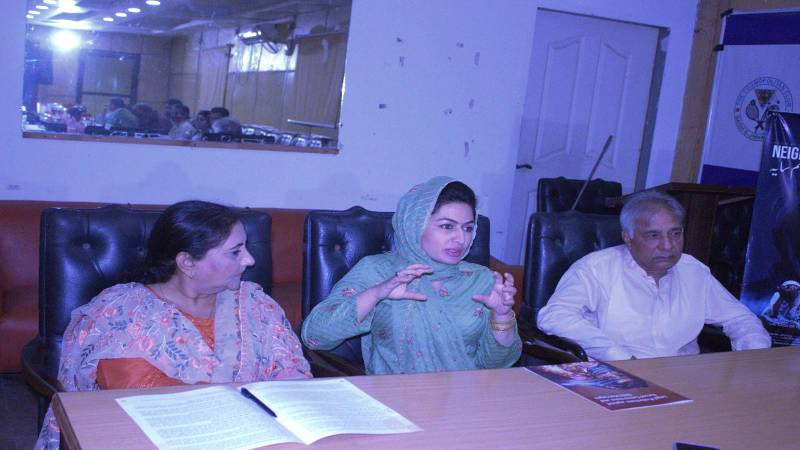
The Centre for Social Justice (CSJ), in collaboration with the Cosmopolitan Club Lahore, hosted a screening of the award-winning documentary film “Hum Saya - Neighbor,” followed by a panel discussion in Lahore.
CSJ’s documentary is based on the true stories of minor girls who have faced forced conversions. The film won the Best Short Documentary on Human Rights award at the prestigious Venice Intercultural Film Festival in 2023 and has been selected for its fifth international screening, including the 7th FICNOVA in Spain in 2024.
Human rights activists Peter Jacob, Nabila Feroz Bhatti, and Prof. Dr. Sara Rizvi Jafree spoke on the pressing issues of forced conversions and child marriages in Pakistan. The speakers emphasized that coerced conversions violate fundamental human rights, yet remain largely unaddressed due to governmental inaction.
Peter Jacob, Executive Director at CSJ, stated that incidents of forced conversion have spiked in recent years. As of August 2024, 35 incidents have been reported, with 11 in Punjab and 24 in Sindh. Since 2021, at least 404 incidents of forced conversions have been documented. In recent UN treaty body reviews (under CERD and CCPR), the government has denied the presence of forced conversions.
Jacob noted that existing laws have proven inadequate in addressing forced conversions and forced marriages. Therefore, a specific law is imperative to regulate faith conversions and criminalize the act of forced conversions, particularly involving underage minority girls.
Dr. Sara Rizvi Jafree, Associate Professor and Chairperson of the Department of Sociology at Forman Christian College University, stressed that extremists may believe they are serving a religious cause by forcibly converting powerless minority females in Pakistan; however, Islam does not condone such actions. The backdrop of forced conversions presents dire and gruesome realities, with females suffering threats, assaults, and rape. After these conversions, the lives of women are often marked by trauma, resentment, and loss of self-identity, resulting in lifelong traumatic experiences that affect both mental and physical health. They also face social challenges such as weakened conjugal bonds, reduced nurturing efforts for childcare, estrangement from family, and difficulties in participating in the workforce, among other issues.
Nabila Feroz Bhatti, a human rights advocate, highlighted that the issues of early child marriage and forced conversion are serious yet neglected problems in Pakistan. The Criminal Law (Amendment) Act 2017 (IV) prohibits forced marriages, making marriage of a minor or a non-Muslim woman an offense punishable by no less than five years of imprisonment. However, this legal safeguard remains largely unimplemented, primarily because the government has failed to acknowledge the severity of these issues. In cases of forced conversion, the government has not effectively enforced existing child marriage restraint laws.
The open discussion revealed a consensus that special safeguards are needed for the protection, privacy, trauma healing, and rehabilitation of victims and survivors. The government must provide strong pro bono legal representation for minor girls.

